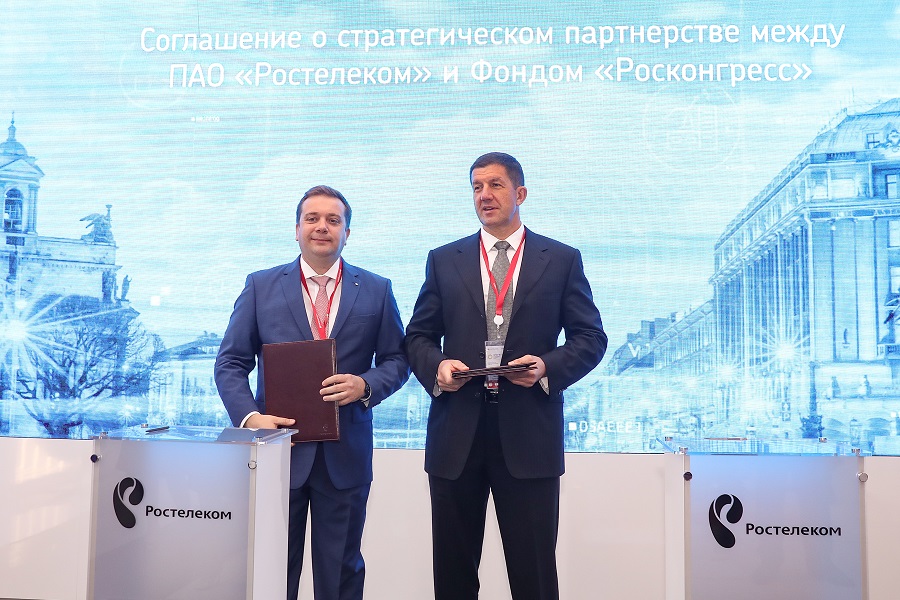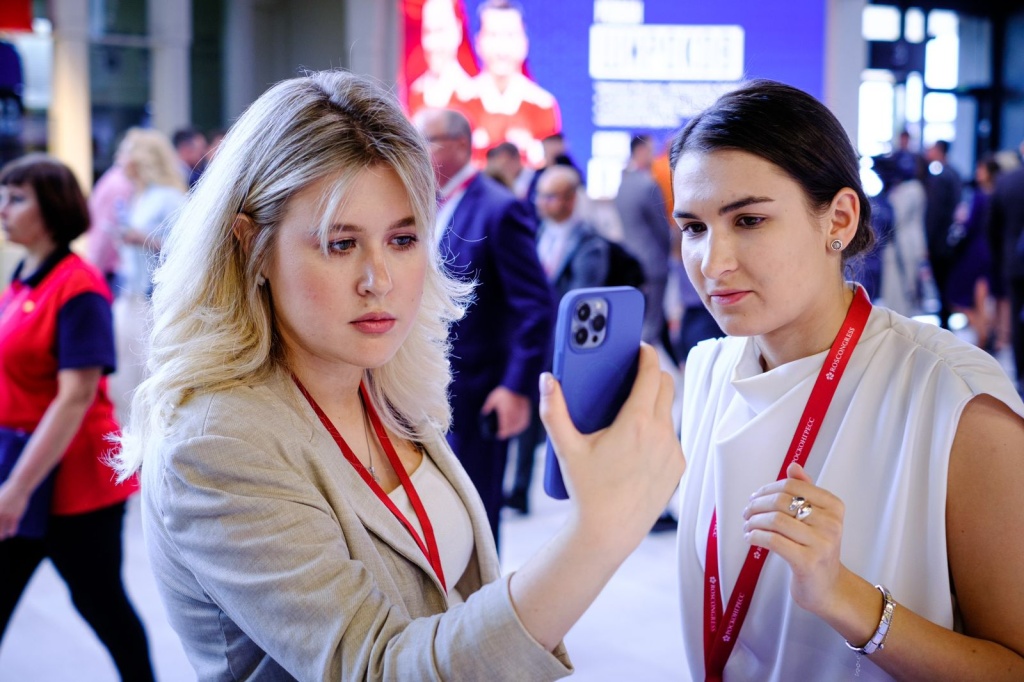
Roscongress Foundation and Rostelecom sign cooperation agreement
The Roscongress Foundation and Rostelecom have signed a long-term cooperation agreement at SPIEF 2018. The aim of the agreement is to facilitate the development of Russia’s economic potential and strengthen the country’s image by organizing conventions, exhibitions, and public events. The signatories were Chairman of the Board and CEO of the Roscongress Foundation Alexander Stuglev and President of Rostelecom Mikhail Oseevsky.
Under the agreement, Rostelecom will act as telecommunications partner for events organized by the Roscongress Foundation. Rostelecom plans to provide Wi-Fi Internet access during events and offer telecommunications services to participants. The company is also intending to sponsor a series of events.
The agreement provides for potential collaboration on projects aimed at preparing the infrastructure of Chelyabinsk to host the BRICS and Shanghai Cooperation Organisation summits in 2020.
According to the agreement, when working on joint projects, the two organizations will, to the extent of their capabilities, pool technical, financial, staff, and other resources, share contacts, and offer reciprocal organizational and planning support.
A project roadmap will set out the main stages of this future collaboration.
Vladimir Putin: You see, today we already mentioned sports, and my good friend, Mr Prime Minister imagined Russia and Japan playing in the World Cup final. This is not a good idea. What if we lose? It would be an unimaginable disaster.
But that is beside the point. The point is we are seeing in the world today a situation where everyone pretends to be playing football, while actually following the rules of judo. What an interesting game that is: not at all football, and not judo either, just chaos. This is where we are headed, and it causes us concern.
This is not just about the so-called sanctions or restrictions. There are people here who feel and understand what this means, and have first-hand experience in this matter. This applies to a vast majority of those present here, since the sanctions truncheon, as has been mentioned here already, is increasingly used against many, not only Russia. Is it good or bad? Can this be overcome or not?
It is clear that the Russian economy has now gained a more stable footing despite the double and triple blows that came with the drop in prices of our traditional exports – energy, metals and chemical products, exacerbated by the pressure of sanctions. We had to face all this at the same time.
However, we were able to find a way through, and have even gone further by strengthening our economy somewhat. I am very grateful to Christine [Lagarde] who said today that she sees positive developments on the macroeconomic side of Russia’s economy. But the losses are still felt by everyone, and development is held back.
In any case, these restrictions hold back the development of Russian businesses, which are unable to fully refinance their loans on international markets, and so forth. At a certain stage, this creates constraints, but once solutions are found, a breakthrough still happens, and everything goes back to normal. For this reason, this policy ultimately makes no economic, political or military sense.
As for the military aspect, I have already mentioned this. One of the reasons behind the attempts to contain Russia is to prevent the development of defence technology. We have shown recently that Russia is now ahead of many of our partners in defence technology despite the sanctions. Therefore, it is pointless, but still pernicious.
<…>
John Micklethwait: Mr Putin, the theme of this conference is “Building trust.” As you know in the rest of Europe, the newspapers over the past couple of days have looked at one particular issue to do with Russia. Yesterday, the Dutch investigation team into the destruction of Malaysia Airlines plane MH17 came forward and said it had proof that the Buk missile that hit the plane came from the 53rd Anti-Aircraft Missile Brigade of the Russian Army based in Kirkuk. When you were asked about this yesterday, you said you did not have an explanation. I wondered now, what is the explanation? Have they made this up? Or was the missile allowed to cross into Ukraine? What happened to the chain of command on this particular issue?
Vladimir Putin: I discussed this issue yesterday, and I can repeat that, unfortunately, we were not allowed to take part in a full-fledged investigation. Therefore, we have no reason to completely trust the results of this investigation. We are not involved in it. The commission conducting this investigation does not heed the arguments we present so that they could be taken into account during the investigation.
I would like to note once again that this is a terrible tragedy. Yesterday, Emmanuel rightly said that we must always remember the families of the people who perished and the people who died as a result of this terrible disaster. Of course, it goes without saying that we will always remember this. But, for some reason, no one even recalls the fact that Ukraine had failed to fulfil its obligations stipulated by the International Civil Aviation Organisation (ICAO) and did not close the air space over the conflict zone.
There are different versions of what happened in this tragedy, but no one considers them. Therefore, it will be very hard for us to accept the findings of this commission, which is working without us, unless there is a full-fledged investigation. That is it.
Unfortunately, we have experienced some other tragic incidents linked with Ukraine. Some time ago, they downed a Russian aircraft flying from Israel over the Black Sea and did not admit their guilt. They did later, but did not pay any compensation whatsoever. Unfortunately, we have a negative history.
Regarding this specific tragic incident, we would like to take a full-fledged part in the investigation.
John Micklethwait: One last question, are you saying this was not a Russia missile? This was not a Russian army missile?
Vladimir Putin: Of course, not.
I repeat: There are several versions of what happened, including a Ukrainian army missile, an aircraft and so on. But, I repeat, there is nothing that would make us trust these findings. This will not happen, unless we fully participate in the investigation.
<…>
John Micklethwait: President Putin, what is your goal for Russia and West? Where do you want to see Russia and the West? Despite all these misunderstandings, we could have gone through many other ones, where do you actually want to take Russia? Do you want St Petersburg, this place, which is seen as the symbol of the Western capital of Russia, can you image this again being integrated into Europe in the sort of way that Mr Macron described?
Vladimir Putin: Each country has its own national priorities and its own interests. I spoke about this in my remarks today. We will certainly strive to attain our national interests. What are they, today and in the near future?
First of all, internal development. We need to ensure the growth of labour productivity in our economy, create an attractive environment for investment, because without investment, it is impossible to meet another important goal – to diversify our economy.
Ms Lagarde here told me about it yesterday and hinted again today. But we had a 4.4 percent growth in fixed investment last year, and 11.5 percent economic growth. This is a good sign –accelerated growth in investment, but this is not enough at all. Absolutely not enough!
To attract capital from friendly companies and countries, we need good relations with Europe, and with the whole world, including the United States. We understand this perfectly and are aware of this.
But if we are faced with a choice – either to remain a sovereign state or to suffer certain restrictions – then, of course, we choose the first option. Because these are too disparate substances to be thrown into the balance: either existence as an independent state, or investment thrown as a bone.
We seek only one thing: we want new rules of the game developed, or the old ones returned in the sphere of security and global economic politics with the help of international institutions that have already been established need to be further developed.
This is the groundwork we need to attain our next goal – to diversify our own economy, and make it innovative. We want to work on artificial intelligence, on robotics, and so on and so forth.
By the way, Christine has voiced concerns about robotics and job losses. This is not so terrible, actually, although such fears do exist, and so does the danger, to be honest. Still, according to experts, including international experts, only 5 percent of jobs worldwide can be entirely automated and only 10 percent of those have been automated so far. So there are good prospects for both our economy and the world economy.
Actually, we need this to achieve our main goal: to improve the lives of our people, to reduce the number of people living below the poverty line, and to raise the main indicator of welfare, life expectancy, to 78 years by 2024 and to 80 plus by 2030, as I already said.
All these tasks are absolutely solvable, but, of course, we need favourable external conditions. We will work for this in every way, not forgetting that it is in our national interest as well, yet we certainly cannot sacrifice our sovereignty and our deep, fundamental interests. I hope that this balance will be found between Russia and our partners.
John Micklethwait: Can I ask you one final question? Who will win the World Cup?
Vladimir Putin: The winners will be the organisers, those who organise this wonderful event at the proper level for the entire international community, for all lovers of this great international game. In any case, this is how we see our mission.
As for the teams, may the best one win, as they say. I would really like it to be a real celebration for everyone who loves sport: for the footballers and for our guests alike. We will make every effort to ensure that fans, experts and players all feel at home in Russia.








